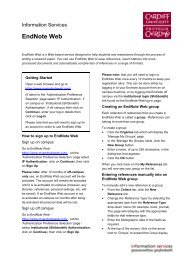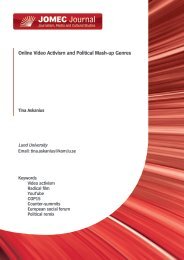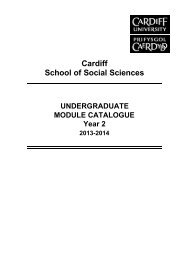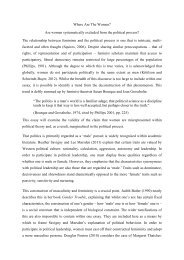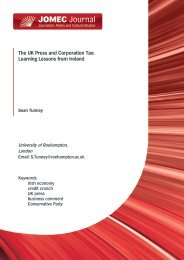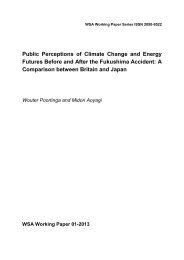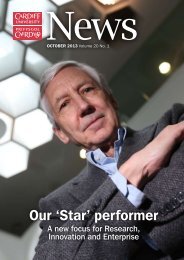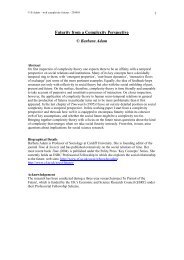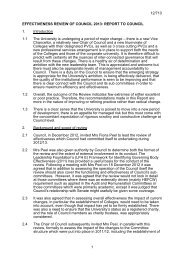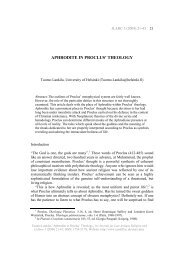Book Reviews - Cardiff University
Book Reviews - Cardiff University
Book Reviews - Cardiff University
You also want an ePaper? Increase the reach of your titles
YUMPU automatically turns print PDFs into web optimized ePapers that Google loves.
JLARC 7 (2013) 97-105<br />
104<br />
Ad Graecos may well have originated in Rome and its theological context, but when he<br />
discusses the relevant parts, this is not always sufficiently taken into account. The simple<br />
personification of the notion of λόγου δύναµις (“word-power”), for example, as a “Wesen<br />
sui generis” (p. 36) does not do justice to the complexity of this concept in the context of<br />
both the Christian Theology of the time and of the Second Sophistic with its rich culture<br />
of rhetorical theorizing. Trelenberg’s personification leads to a simplification of Tatian’s<br />
thought which does not do justice to the level of his hermeneutical thinking, evident, for<br />
example, in the way he explains the interaction of semantic meaning and physical sound<br />
in the acts of speaking and listening (or. 5.5). There is a danger here of “mythologizing”<br />
something which evidently is not meant to be mythological. Tatian’s “power of the word”<br />
is not a separate being in addition to God and the Logos, as Trelenberg’s account seems<br />
to suggest, but a theological concept developed to explain the relationship between God<br />
and the Word in analogy to what we know about the way human language works.<br />
This tendency to read the theological parts of Ad Graecos mythologically is mirrored<br />
in the way heresiological accounts are taken at face value in the chapter dealing with the<br />
question whether Tatian was a Gnostic (pp. 204-219). There is a connection between the<br />
two observations that all that ancient heresiologists have to say about Tatian’s Gnosticism<br />
and other heresies is ultimately derived from Irenaeus and that all that Irenaeus says about<br />
Tatian in that regard can be evidenced from Ad Graecos. “There is nothing in Tatian that<br />
cannot also be found in any other Apologist,” Trelenberg concedes (p. 217). Still, “only a<br />
well-meaning interpretation will situate him within ecclesiastical orthodoxy; in individual<br />
cases he definitely strays outside this context” (p. 219). Trelenberg may just try to be fair<br />
here and provide a balanced account, but recent studies such as Naomi Koltun-Fromm’s 5<br />
have shown that the view that Tatian was a heretic, which includes the charge that he was<br />
a Gnostic, is entirely a construction. There is no balance to strike here. As Trelenberg’s<br />
own evidence shows, it begins with Irenaeus and ends with Arethas, author of the tenth<br />
century Scholia Arethae, who saw Tatian as a proto-Arian on account of or. 5.2, where<br />
the Logos is called the “work” (ἔργον) of the Father. The fact that Trelenberg (p. 37f.)<br />
“defends” Tatian against this charge, while he nevertheless feels “irritated” by Tatian’s<br />
use of the expression indicates how close he still is to that tradition and how much he is<br />
in danger of simply continuing the heresiological narrative instead of subjecting it to a<br />
thorough critique. Yet again, admittedly, to provide such a critique may not be the primary<br />
task of an introductory chapter in a volume such as this.<br />
Finally, some notes on the brief section dealing with the question of the genre of the<br />
work (pp. 230-240). On p. 15 Trelenberg rightly points out that Ad Graecos is composed<br />
of quite diverse elements (didactic, polemical, archival materials etc.), which originated<br />
over a longer period of time and were at some later point subjected to an “Endredaktion”.<br />
Tatian himself hints at this, when he speaks or. 37.2 of having begun to write that part of<br />
the work at an earlier stage and now taking it up again after abandoning it for some time,<br />
and or. 42.1 of having “arranged” (συνέταξα) his material rather than having written it in<br />
one go. On pp. 231-233, however, when he criticizes Kukula’s ideas regarding a possible<br />
school-context for an oral presentation of certain parts of the speech, Trelenberg seems to<br />
have forgotten his earlier observation and calls in question a possible school context on<br />
the ground that it is not at all certain that Tatian founded a school in “the East”. But if Ad<br />
Graecos contains earlier material as well, surely it could contain material which Tatian<br />
might have delivered at some point during his Roman period.<br />
5 Koltun-Fromm, N., “Re-Imagining Tatian: The Damaging Effects of Polemical Rhetoric,” in:<br />
Journal of Early Christian Studies 16 (2008), pp. 1-30.<br />
<strong>Book</strong> <strong>Reviews</strong> in: Journal for Late Antique Religion and Culture 7 (2013) 97-105;<br />
ISSN: 1754-517X; Website: http://www.cardiff.ac.uk/clarc/jlarc



